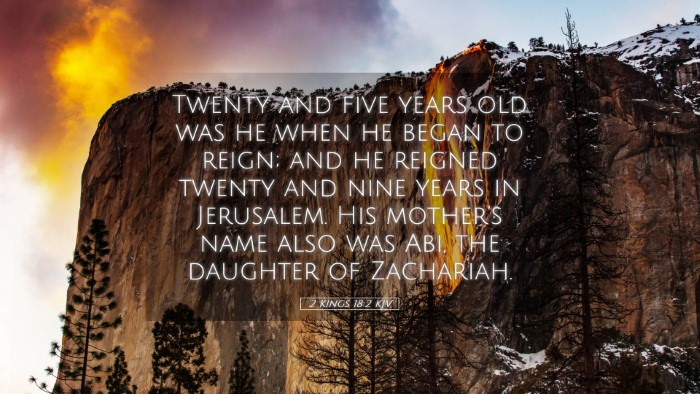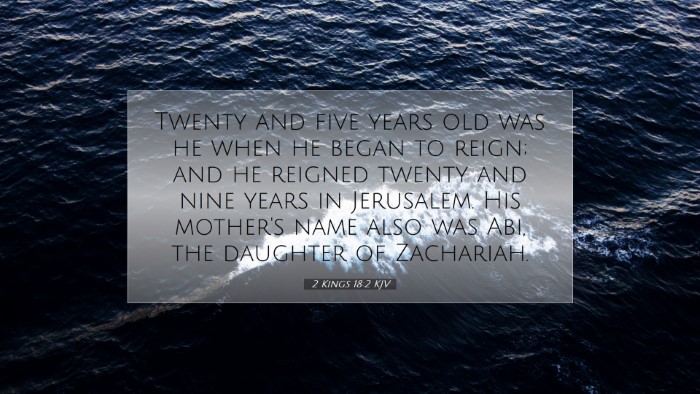Commentary on 2 Kings 18:2
Verse: "He was twenty-five years old when he became king, and he reigned in Jerusalem twenty-nine years. His mother’s name was Abi, daughter of Zechariah."
Introduction
This verse marks the ascension of Hezekiah to the throne of Judah, providing a significant bridge in the history of Israel's monarchy. The historical accounts presented in 2 Kings, combined with insights from public domain commentaries, articulate the importance of Hezekiah's reign within the context of Israel's moral and spiritual trajectory.
The Significance of Age at Ascension
Age of Hezekiah: Hezekiah ascended to the throne at the age of twenty-five. This detail not only provides a temporal context for his rule but also signifies the youthful vigor and potential for reform he embodies.
- Matthew Henry: Henry notes that the age of Hezekiah reflects a period where he was still within the threshold of maturity, thus his leadership could be seen as a time for innovative reforms.
- Albert Barnes: Barnes emphasizes that his youthfulness could also imply a naïve or inexperienced approach, yet it became a catalyst for significant spiritual revival in Judah.
His Mother’s Influence
Mother’s Identity: The mention of Hezekiah's mother, Abi, daughter of Zechariah, provides a tangible link to his heritage.
- Adam Clarke: Clarke suggests that the maternal influence in ancient times often played a crucial role in shaping the spiritual and ethical outlook of a ruler. Hezekiah’s lineage may suggest a pious background that fostered his devout fidelity to Yahweh.
- Matthew Henry: Henry explains that the inclusion of his mother’s name indicates the significance of maternal lineage in the royal line, and these familial connections often dictate the future king's allegiance to God or idolatry.
Duration of Reign
Length of Reign: Hezekiah reigned for twenty-nine years, a time notable for both trials and triumphs.
- Albert Barnes: Barnes posits that the longevity of Hezekiah’s reign contributed to stability in Judah during a tumultuous period marked by Assyrian threats.
- Matthew Henry: Henry points out that a reign of such duration offered opportunities for Hezekiah to implement extensive reforms and religious revival, showcasing the contrasting legacy of prior kings.
Leadership and Reforms
Spiritual Reforms: Hezekiah is widely recognized for his religious reforms aimed at returning Judah to the worship of Yahweh. This is set against the backdrop of the moral failings of previous leaders.
- Matthew Henry: He highlights that Hezekiah's reforms included the removal of high places and idols, emphasizing the need for purity in worship.
- Albert Barnes: Barnes adds that the re-establishment of the Passover and the temple worship was one of the key achievements during his reign, symbolizing a collective return to God.
Challenges Faced by Hezekiah
Assyrian Threat: During Hezekiah's reign, Judah faced significant challenges, especially from the Assyrian empire, notably under the rule of Sennacherib.
- Adam Clarke: Clarke indicates that these geopolitical challenges tested Hezekiah's faith and leadership, ultimately forcing him to rely on divine help.
- Matthew Henry: He points out that Hezekiah's faith in God during the siege demonstrated a profound integrity and reliance on divine intervention, which had a lasting impact on Judah’s identity as a nation set apart for worship.
Theological Reflections
Faith and Leadership: Hezekiah’s story can be drawn upon for lessons in faith-based leadership, especially in crises.
- Albert Barnes: Reflects on the way Hezekiah demonstrated reliance on God, underscoring the importance of faith in public life.
- Matthew Henry: Emphasizes that despite trials, Hezekiah’s commitment to seeking God serves as an example of how leaders should respond to adversity.
Conclusion
The short overview of 2 Kings 18:2 encapsulates a pivotal moment in Judah's history under King Hezekiah. His reign exemplifies the potential for renewal and providence in leadership, even amidst adversity. As scholars, pastors, and students engage with this verse, they are encouraged to reflect on the profound implications of Hezekiah's faithfulness and the monumental events of his time.


